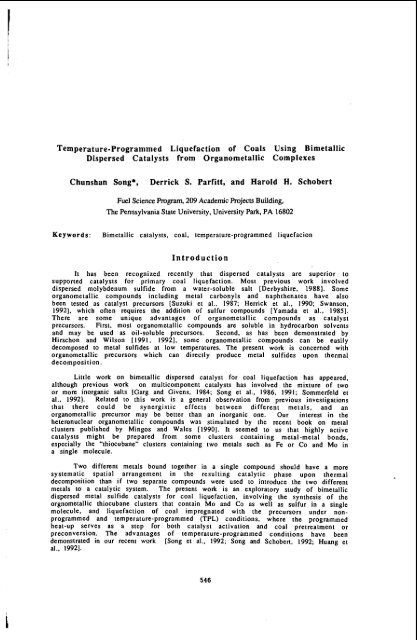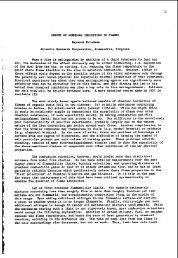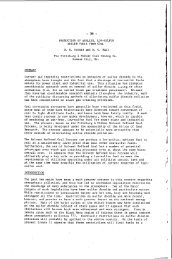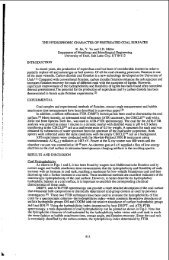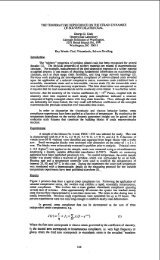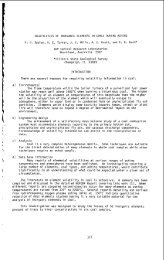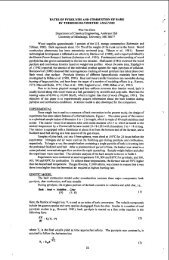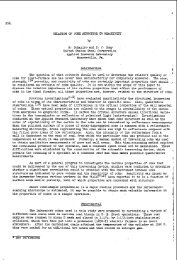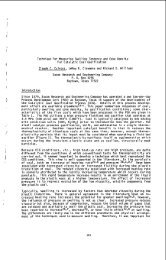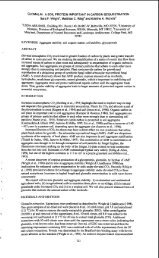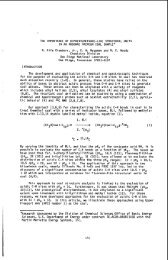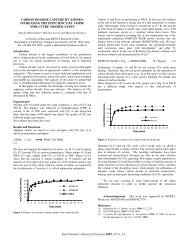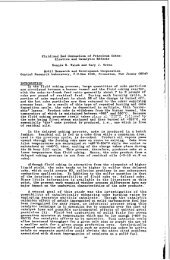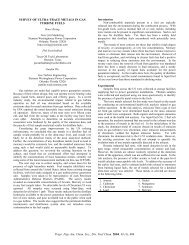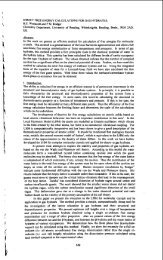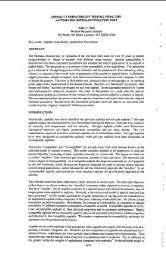liquefaction pathways of bituminous subbituminous coals andtheir
liquefaction pathways of bituminous subbituminous coals andtheir
liquefaction pathways of bituminous subbituminous coals andtheir
You also want an ePaper? Increase the reach of your titles
YUMPU automatically turns print PDFs into web optimized ePapers that Google loves.
i<br />
Temperature-Programmed Liquefaction <strong>of</strong> Coals Using Bimetallic<br />
Dispersed Catalysts from Organometallic Complexes<br />
Chunshan Song*, Derrick S. Parfitt, and Harold H. Schobert<br />
Fuel Science Program, 209 Academic Rojects Building,<br />
The Pennsylvania State University, University Park, PA 16802<br />
Keywords: Bimetallic catalysts, coal, temperature-programmed liquefacion<br />
Introduction<br />
It has been recognized recently that dispersed catalysts are superior to<br />
supported catalysts for primary coal <strong>liquefaction</strong>. Most previous work involved<br />
dispersed molybdenum sulfide from a water-soluble salt [Derbyshire, 19881. Some<br />
organometallic compounds including metal carbonyls and naphthenates have also<br />
been tested as catalyst precursors [Suzuki et al.. 1987; Herrick et al.. 1990; Swanson.<br />
19921. which <strong>of</strong>ten requires the addition <strong>of</strong> sulfur compounds [Yamada et al., 19851.<br />
There are some unique advantages <strong>of</strong> organometallic compounds as catalyst<br />
precursors. First. most organometallic compounds are soluble in hydrocarbon solvents<br />
and may be used as oil-soluble precursors. Second, as has been demonstrated by<br />
Hirschon and Wilson [1991, 19921. some organometallic compounds can be easily<br />
decomposed to metal sulfides at low temperatures. The present work is concerned with<br />
organometallic precursors which can directly produce metal sulfides upon thermal<br />
decomposition.<br />
Little work on bimetallic dispersed catalyst for coal <strong>liquefaction</strong> has appeared,<br />
although previous work on multicomponent catalysts has involved the mixture <strong>of</strong> two<br />
or more inorganic salts [Garg and Givens, 1984; Song et al., 1986, 1991; Sommerfeld et<br />
al.. 19921. Related to this work is a general observation from previous investigations<br />
that there could be synergistic effects between different metals. and an<br />
organometallic precursor may be better than an inorganic one. Our interest in the<br />
heteronuclear organometallic compounds was stimulated by the recent book on metal<br />
clusters published by Mingos and Wales [19901. It seemed to us that highly active<br />
catalysts might be prepared from some clusters containing metal-metal bonds.<br />
especially the “thiocubane” clusters containing two metals such as Fe or Co and Mo in<br />
a single molecule.<br />
Two different metals bound together in a single compound should have a more<br />
systematic spatial arrangement in the resulting catalytic phase upon thermal<br />
decomposition than if two separate compounds were used to introduce the two different<br />
metals to a catalytic system. The present work is an exploratory study <strong>of</strong> bimetallic<br />
dispersed metal sulfide catalysts for coal <strong>liquefaction</strong>. involving the synthesis <strong>of</strong> the<br />
orgnometallic thiocubane clusters that contain Mo and Co as well as sulfur in a single<br />
molecule, and <strong>liquefaction</strong> <strong>of</strong> coal impregnated with the precursors under non-<br />
programmed and temperature-programmed (TPL) conditions, where the programmed<br />
heat-up serves as a step for both catalyst activation and coal pretreatment or<br />
preconversion. The advantages <strong>of</strong> temperature-programmed conditions have been<br />
demonstrated in our recent work [Song et al.. 1992; Song and Schoben. 1992; Huang et<br />
al., 19921.<br />
546


